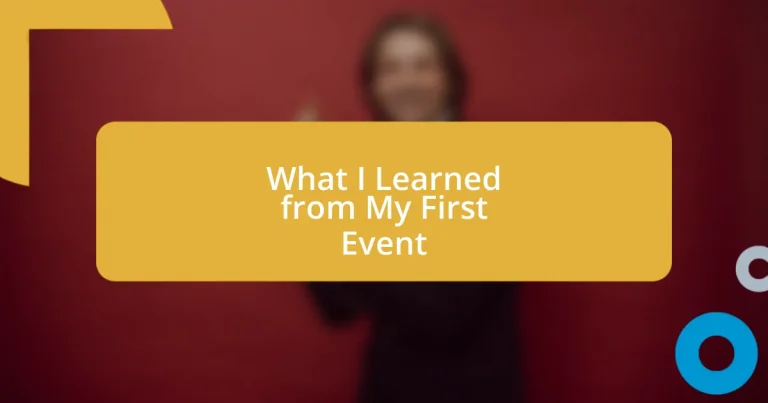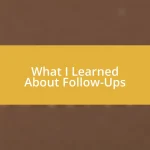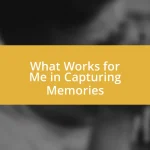Key takeaways:
- Being authentic fosters deeper connections; sharing personal stories can be more impactful than rehearsed pitches.
- Effective planning, including setting clear goals and preparing for contingencies, is essential for successfully managing events.
- Post-event reflection and follow-up communication are crucial for nurturing relationships and improving future events.
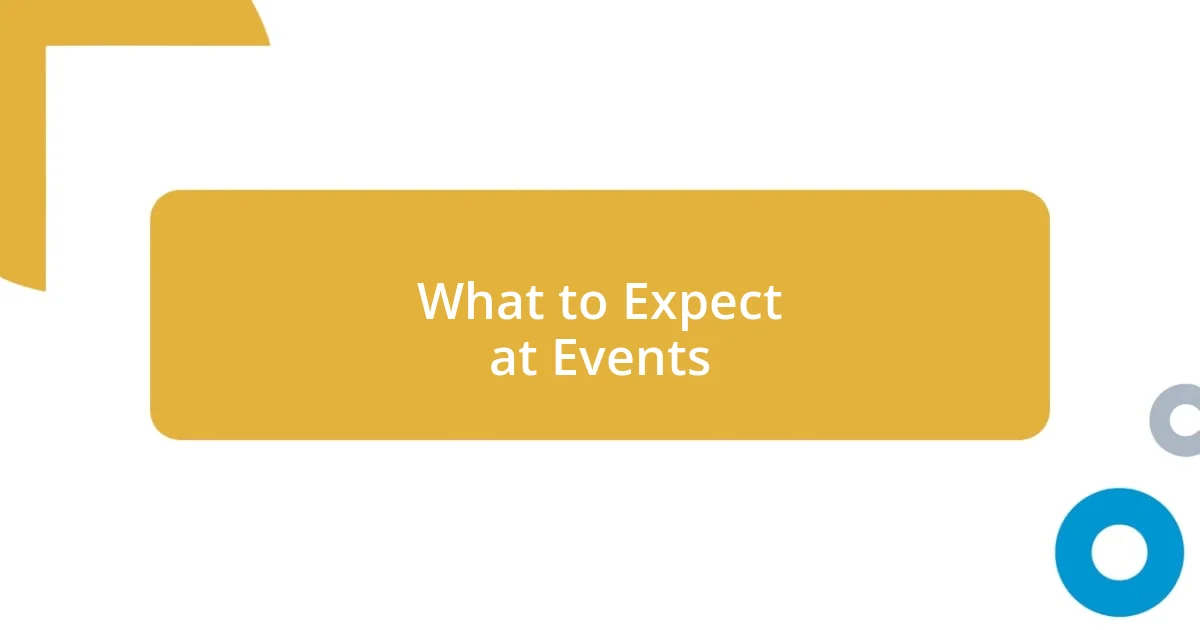
What to Expect at Events
When I attended my first event, I was surprised by the sheer number of people buzzing with excitement and energy. The atmosphere can feel a bit overwhelming at times, especially if you’re new to networking. Have you ever felt that thrill and nervousness all at once? I certainly did.
One key takeaway is that not every moment will go as planned. During one event, I accidentally spilled coffee on my notes while striking up a conversation. Instead of panicking, I laughed it off, which surprisingly led to a fantastic discussion with a stranger who shared my humor. It taught me that embracing the unexpected can create delightful connections.
Expect a mix of formal and informal interactions. You might find yourself in a workshop one minute and mingling with industry professionals the next. I still remember the engaging panel discussion that sparked fantastic ideas, while later, an impromptu chat with a fellow attendee turned into a brainstorming session that I’ll never forget. Isn’t it incredible how much you can learn in a single day?
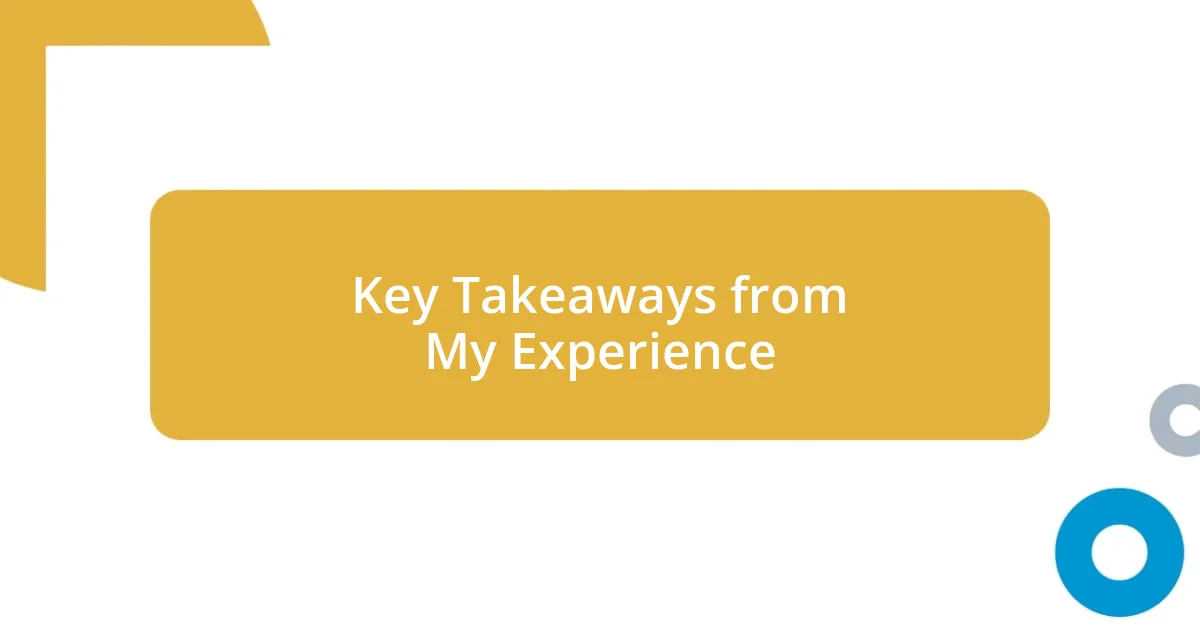
Key Takeaways from My Experience
Certainly! Here’s the content for the section titled ‘Key Takeaways from My Experience’, incorporating engaging anecdotes and insights:
One of the biggest lessons I took away from my first event was the importance of preparation. I remember spending hours crafting my elevator pitch, only to realize that genuine conversations often take unexpected turns. During one interaction, instead of reciting my rehearsed lines, I shared a personal story about my journey in the industry. That openness led to a deeper connection, proving that authenticity can be far more valuable than a polished presentation.
Another noteworthy takeaway was the significance of following up after the event. Initially, I underestimated this step. After an enriching conversation with a keynote speaker, I sent a simple thank-you email. To my surprise, it ignited a dialogue that resulted in mentorship opportunities down the line. It reinforced my belief that nurturing relationships is as crucial as building them in the first place.
Lastly, the event underscored the value of listening. I recall engaging in a group discussion where I was tempted to interject with my thoughts. However, taking a step back and fully absorbing others’ perspectives enriched not just my knowledge but the conversation’s quality. It reminded me that sometimes, silence is golden, and listening can lead to discovering innovative ideas.
| Key Lesson | Description |
|---|---|
| Authenticity | Being genuine often fosters deeper connections than rehearsed pitches. |
| Follow-Up | Nurturing relationships post-event can lead to unexpected opportunities. |
| Active Listening | Listening fosters valuable insights and enhances conversations. |
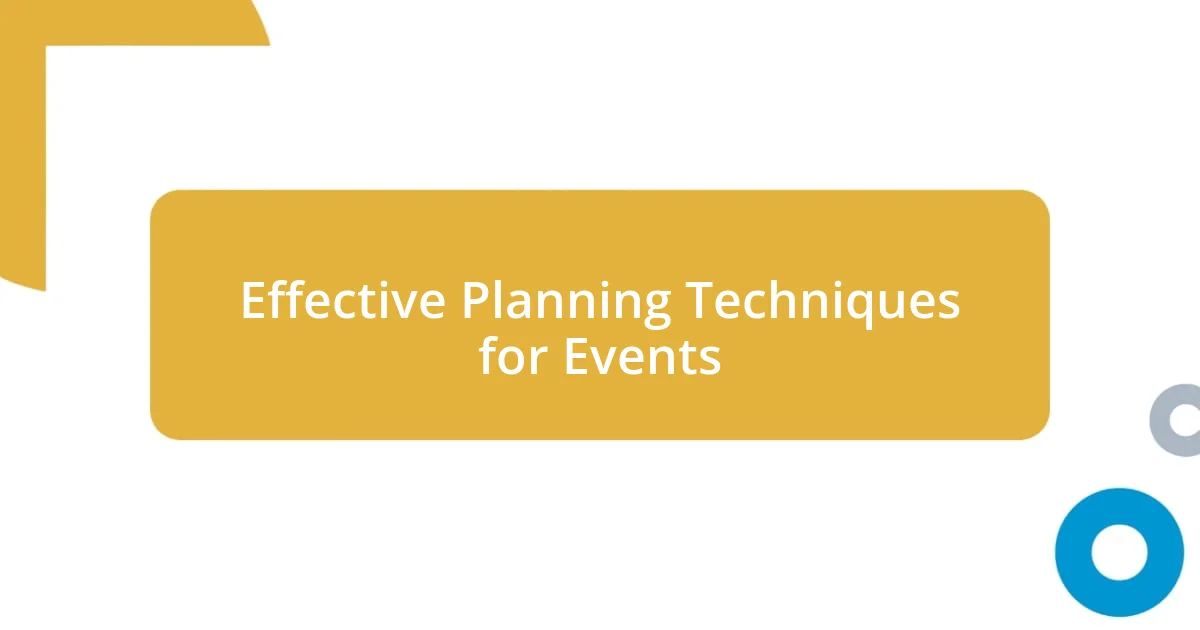
Effective Planning Techniques for Events
Effective planning is the backbone of any successful event, and I learned firsthand just how crucial it is to stay organized. When I started preparing for my first event, I created a detailed checklist that became my guiding light. Each task was a small victory. Yet, the moment I strayed from it—thinking I could handle things spontaneously—I found myself a bit lost. The experience taught me that while flexibility is valuable, a solid plan keeps you grounded.
Here are some effective planning techniques that can make a significant difference:
- Set Clear Goals: Identify what you want to achieve. Is it networking, learning, or showcasing a product? Clarity is key.
- Create a Timeline: Break down the planning process into manageable segments. This can help alleviate last-minute stress.
- Understand Your Audience: Tailoring your event to meet the needs of your attendees can enhance their experience and engagement.
- Prepare for Contingencies: Anticipate possible challenges and have backup plans ready. This prepares you for the unexpected.
- Engage Your Team: Involve everyone in the planning process. This fosters a sense of ownership and can lead to creative ideas that you might not have considered.
I found that consulting with my team not only lightened the workload but also brought diverse perspectives that enriched the planning process. It made me realize that collaboration is not just a technique—it’s an experience that can yield positive outcomes.
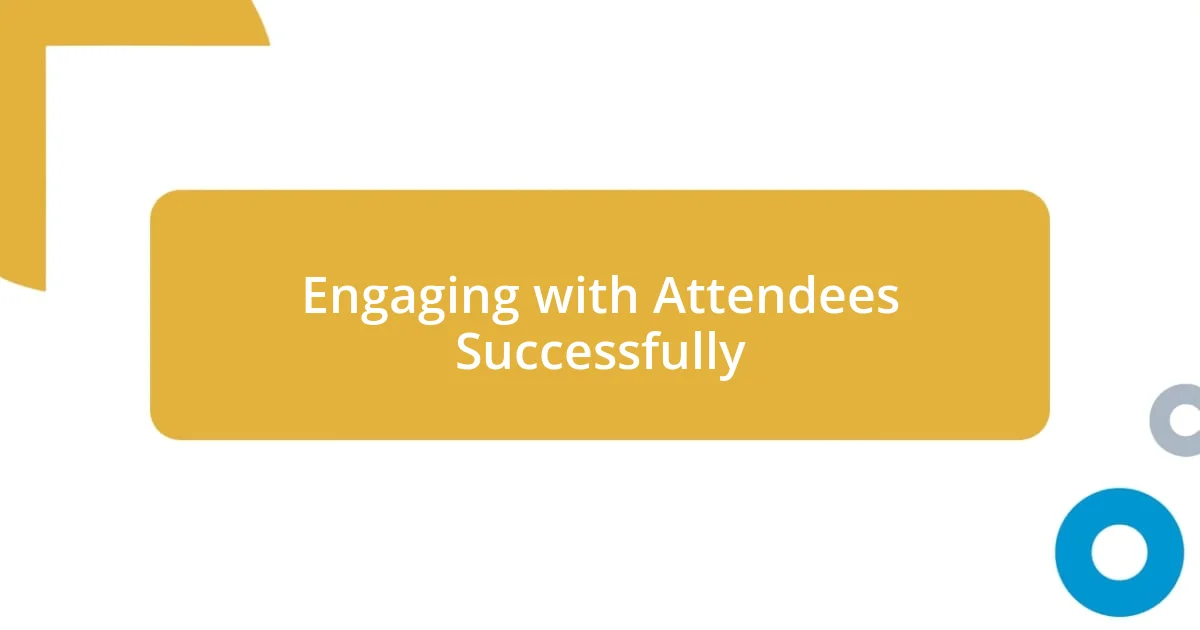
Engaging with Attendees Successfully
Engaging with attendees goes beyond simply exchanging business cards or shaking hands. I remember one moment when I noticed a lone attendee looking overwhelmed by the crowd. Instead of waiting for people to approach him, I took the initiative and invited him to join my conversation circle. That small act led to a dynamic discussion, highlighting how a welcoming approach can transform the atmosphere of the event. Have you ever realized how infectious genuine enthusiasm can be?
One key strategy I adopted was to incorporate interactive elements into my discussions. During a breakout session, we used live polls to gauge opinions on various topics. The excitement in the room was palpable, and feedback came pouring in, sparking debates I never anticipated. This experience taught me that participation ignites passion; the more involved attendees feel, the richer the dialogue becomes. Isn’t it fascinating how a simple poll can foster such an engaging environment?
In my journey of engaging with attendees, I found that humor plays an invaluable role. During a particularly tense moment while addressing a challenging topic, I decided to lighten the mood with a light-hearted joke related to the discussion. The laughter that ensued not only eased the tension but also made everyone feel more relaxed and open. It’s moments like these that remind me: how we connect with attendees really shapes their overall experience. Don’t we all appreciate a little humor to break the ice?
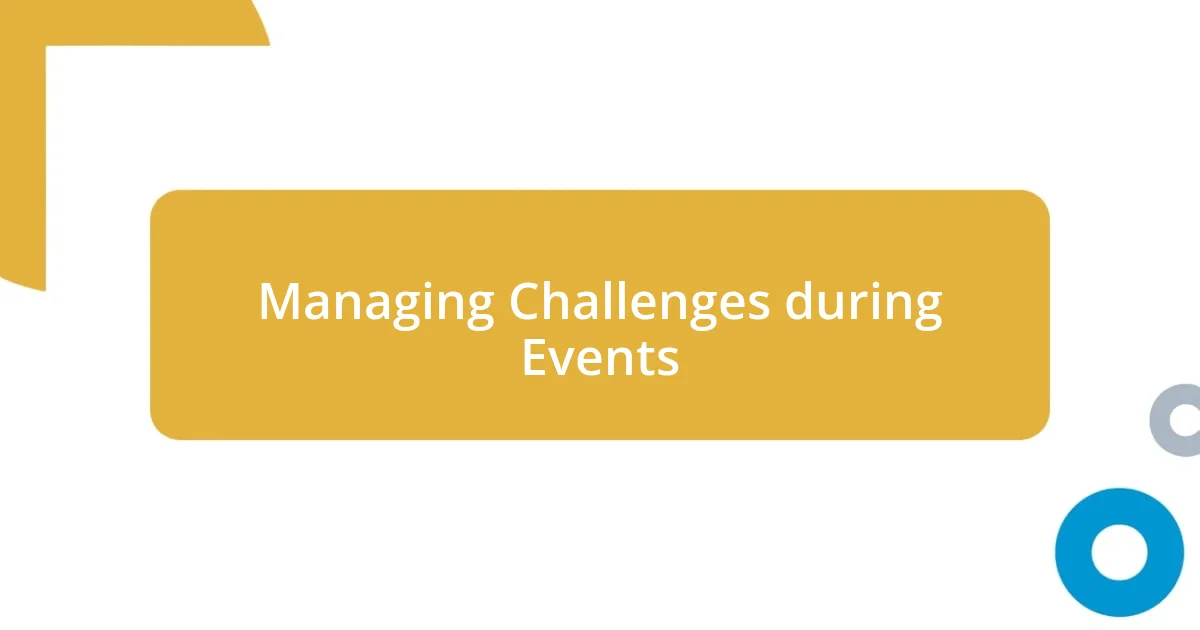
Managing Challenges during Events
Managing challenges during events is something I faced head-on, and it was eye-opening. For instance, during my first event, the sound system malfunctioned just moments before the opening remarks. I felt a wave of panic, but I quickly remembered my contingency plans. Instead of freezing, I calmly coordinated with the tech team to troubleshoot the issue while engaging the audience with a brief story from my planning experience. It taught me that staying composed can help turn a potential disaster into an opportunity for connection.
Another memorable challenge was managing the unexpected late arrival of a key speaker. I had to think on my feet, so I decided to facilitate a panel discussion to fill the time. Not only did it keep the audience entertained, but it also highlighted the contributions of other speakers, showcasing their expertise. Have you ever noticed how improvisation can often lead to delightful surprises? It reminded me that adaptability is as crucial as planning, transforming issues into moments of accidental brilliance.
Finally, I learned the importance of self-care amid challenges. There was a moment when I felt utterly exhausted and overwhelmed by the pressure of everything running perfectly. I realized that stepping away for just a few minutes to breathe and regroup made a world of difference. This experience reinforced the idea that taking care of yourself allows you to better manage unforeseen challenges. It’s easy to overlook our own well-being when juggling so much, isn’t it?

Post-Event Reflection and Improvement
Reflecting on my first event, I found that taking time for post-event analysis was crucial. After the event, I gathered feedback from attendees and my team, creating a space for honest conversations. I remember how a single comment about our scheduling really struck me—someone mentioned they felt rushed during a key presentation. This made me realize the importance of pacing; it’s not just about filling the time slot but about enriching the experience. How often do we overlook the rhythm of an event?
As I sorted through the insights, I couldn’t help but feel a mixture of pride and regret. While there were many successes, the issues we faced were just as valuable learning experiences. One evident takeaway was the need to improve our follow-up communication. I realized that keeping the connection alive after the event can reinforce relationships and enhance future engagement. I mean, when has a thoughtful email or a simple thank-you ever gone unnoticed?
Finally, I came to appreciate the necessity of documenting everything! I made a detailed report that included what went well and areas for improvement, which is something I wish I had done during the planning phase. This reflection has since served as my personal guidebook for future events. It dawned on me that each step we take in evaluating our experiences sets the foundation for becoming better event hosts. Isn’t it exciting to think about how much we can learn simply by looking back?

Developing Skills for Future Events
Developing my skills for future events went beyond just managing challenges; it was about embracing the entire learning process. One thing I noticed is that preparing for potential hiccups ahead of time has made subsequent events feel less daunting. It’s funny, but when I found myself creating checklists and contingency plans, I felt a sense of empowerment. Have you ever felt that rush when you’re prepared? It’s like having a safety net that allows you to take risks while knowing you’ve got a plan B.
Another aspect that proved invaluable was honing my communication skills. Leading up to my first event, I practiced delivering clear and concise messages. I remember rehearsing with friends, which not only helped me gather confidence but also highlighted how crucial it is to speak effectively in high-pressure situations. You probably know the struggle of trying to communicate everything at once; it can be overwhelming, right? This taught me that clarity not only engages your audience but also eases the stress of the moment.
Lastly, I realized the significance of collaboration. Working closely with my team opened my eyes to the breadth of skills each member brought to the table. I often found myself asking for their input and it led to some fantastic ideas! It feels rewarding to recognize that event planning isn’t a solo venture; it’s a collective effort. Have you ever considered how much innovation can stem from brainstorming with others? Leaving behind the notion of working in isolation transformed my approach. Now, I’m eager to build long-term relationships that can enrich future events even further.












